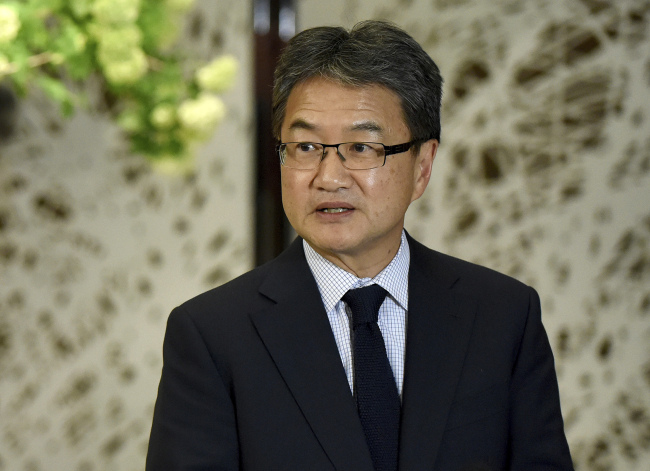Acknowledging that the US policy of “maximum pressure” and its focus on North Korea’s denuclearization have failed to change the reclusive regime, Joseph Yun, former US special representative for North Korea policy, said the incoming Joe Biden administration should steer both denuclearization and peace building in tandem in dealing with the North.
Yun, who served as Washington’s point man on North Korea during the early Trump administration, stressed that Biden needs to take the reality of the North Korea situation into account when devising policy on Pyongyang: North Korea will not denuclearize anytime soon, and “maximum pressure” does not work.
“I think this is where the US has to accept that policy of pressure has failed. It cannot be all pressure. Also a policy of emphasizing only denuclearization has failed,” Yun said at a forum organized by the state-run think tank the Korea Institute for National Unification on Thursday.
“We need to make denuclearization a goal but also peace building an equal goal. … These two goals must be equal in status and move in tandem.”
He stressed that this two-goal policy is a “very long-term project,” as it requires peace and denuclearization to make equal progress together “hand in hand.” But this approach will appeal to both Koreas as well as China, he added.
The starting point for Biden, he said, is to send a message to Pyongyang that the engagement door will remain open and to acknowledge the 2018 Singapore agreement between US President Donald Trump and North Korean leader Kim Jong-un -- not to throw away everything Trump has done. Under the Singapore agreement, the North committed to work toward the complete denuclearization of the Korean Peninsula in return for security guarantees from the US.
“You may agree or disagree with many of things that Trump has done, but I do think he made some positive contribution on North Korea. And one of them was opening new channel. There is no reason to close those new channels.”
Lee Jong-suk, former unification minister and senior fellow at the Sejong Institute, expressed a similar stance -- that Biden needs to uphold the results of the Singapore summit -- adding that the terms of the agreement are even more abstract than those of the joint communique between then-US President Bill Clinton and then-North Korean leader Kim Jong-il in 2000.
“There is nothing negative for Biden on respecting the (Singapore) agreement,” said Lee. “Because with (Biden’s) mention that the agreement will be maintained, North Korea won’t readily provoke.”
Victor Cha, the Korea chair at the Center for Strategic and International Studies, also agreed the new Biden administration should “not throw everything away from the past” but should “pocket” Kim’s denuclearization commitment to Trump in Singapore.
He also suggested a denuclearization strategy “that does not increase North Korea’s nuclear weapons,” adding that past administrations had failed to stop Pyongyang from amassing nuclear warheads and missiles for decades.
Cha, director for Asia affairs at the National Security Council under the George W. Bush administration, said Biden should first negotiate a freeze agreement on the North’s nuclear complex, but should also focus on political aspects, such as normalizing US-North Korea relations, security assurances, a peace declaration and dialogue on human rights.
“With each administration, we tried different things. We’ve tried incremental, we’ve tried bilateral, multilateral, extreme sanctions and summit diplomacy,” he said. “The piece we haven’t tried yet is really focusing on trying to change the political relationship such that we can move past the incremental freeze to the harder part of denuclearization.”
Many experts at the forum agreed that issues regarding the Korean Peninsula could remain a low priority for the new US administration for months, given the country’s immediate domestic challenges, including COVID-19 and the economy. In the foreign policy arena, Biden would want to focus on rejoining the Paris Agreement, reviving the Iran nuclear deal and dealing with the ongoing US-China rivalry.
This means it will take a while for Washington’s North Korea policy to take shape, putting pressure on South Korean President Moon Jae-in, who hopes to break the impasse between the two Koreas and take major strides toward denuclearization during the remainder of his term.
“What Seoul should do now is try to set the table to try to foster the environment in East Asia that is conducive for the Biden administration, when they are looking around the world to set their priorities, (and) to look to Korea as some place they can make sort of meaningful, historical progress for Joe Biden,” said Harry Kazianis, senior director of Korean studies at the Center for the National Interest.
Specifically, he called on Seoul to use all possible means to get to North Korea and make it refrain from any provocations. Also, Seoul should throw out the suggestion that Pyongyang pick an interlocutor, someone Kim Jong-un “respects, trusts and that could delegate some meaningful authority to,” such as his younger sister Kim Yo-jong, for working-level talks with Washington.
“If Biden administration is willing and Seoul could act as that bridge, maybe you could have a first meeting on the DMZ,” he said.
By Ahn Sung-mi (
sahn@heraldcorp.com)




![[Herald Interview] 'Trump will use tariffs as first line of defense for American manufacturing'](http://res.heraldm.com/phpwas/restmb_idxmake.php?idx=644&simg=/content/image/2024/11/26/20241126050017_0.jpg)

![[Health and care] Getting cancer young: Why cancer isn’t just an older person’s battle](http://res.heraldm.com/phpwas/restmb_idxmake.php?idx=644&simg=/content/image/2024/11/26/20241126050043_0.jpg)

![[Graphic News] International marriages on rise in Korea](http://res.heraldm.com/phpwas/restmb_idxmake.php?idx=644&simg=/content/image/2024/11/25/20241125050091_0.gif)